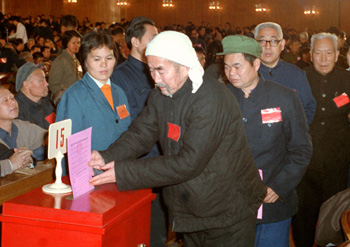| Tools: Save | Print | E-mail | Most Read |
| China Questions and Answers |
| Adjust font size: |
Q: In Western countries, laws are usually drawn by congresses with unitary, composite or checks-and-balances legislative systems. Compared with these systems, what features does the Chinese legislative system have? What progress has China made in developing democratic politics, administering state affairs according to law and establishing a country ruled by law? A: Compared with unitary, composite and balanced legislative systems commonly existing in other countries, the Chinese legislative system is unique. First, the legislative power in China is not handled by one particular department or person, therefore the Chinese legislative system is not a unitary one. Second, there are several kinds of legislative powers in China, such as state legislative power, administrative regulations legislative power, and local regulations legislative power. Different departments perform these powers, so the Chinese legislative system does not belong to a composite one. Third, the Chinese legislative system is not checks-and-balances one, for it is not based on the principle of checks-and-balances among legislative, administrative and judicial departments. The National People's Congress (NPC) elects both the president of the People's Republic of China and the premier of the State Council. The president puts forth laws in pursuance of the decisions of the NPC and its Standing Committee, and the premier has no power to approve or veto legislation of the NPC. Administrative regulations shall not contravene laws adopted by the NPC, local regulations shall not contravene laws and administrative regulations, and the NPC has the power to annul administrative regulations and local regulations that contravene the laws it has made. All of these guidelines indicate the affiliation, unification and supervision in the Chinese legislative system, not a checks-and-balances relationship. The present Chinese legislative framework was established by the Constitution in 1982. In terms of legislative power, it consists of both the leadership of the Central Government and division of power to a certain extent. The NPC and its Standing Committee make national laws, the State Council and its departments draw up administrative regulations and rules, and local people's congresses and governments make local regulations and rules. But their powers and the force of the legal documents are different, forming a legislative system that includes state legislative power, administrative regulations legislative power, local regulations legislative power, autonomous regulations and special rules legislative power, rules legislative power, delegated legislative power and legislative power of special administrative regions. With such a legislative system, work in Chinese legislation has obtained great achievements. Statistics show that from 1979 to March 2003, besides the Constitution in 1982 and three constitutional amendments, the NPC and its Standing Committee enacted more than 420 laws and decisions on related legal issues, the State Council drew up more than 900 administrative regulations, local people's congresses with legislative power formulated or approved more than 8,000 local regulations, and departments under the State Council or local governments made more than 50,000 rules according to their functions. All of these legal documents lead to a situation where there are laws to follow in the significant and ordinary aspects of the country, laying a solid foundation for the socialist legal system with Chinese characteristics.
|
| Tools: Save | Print | E-mail | Most Read |
 |
| Related Stories |
|
Product Directory China Search |
Country Search Hot Buys |
